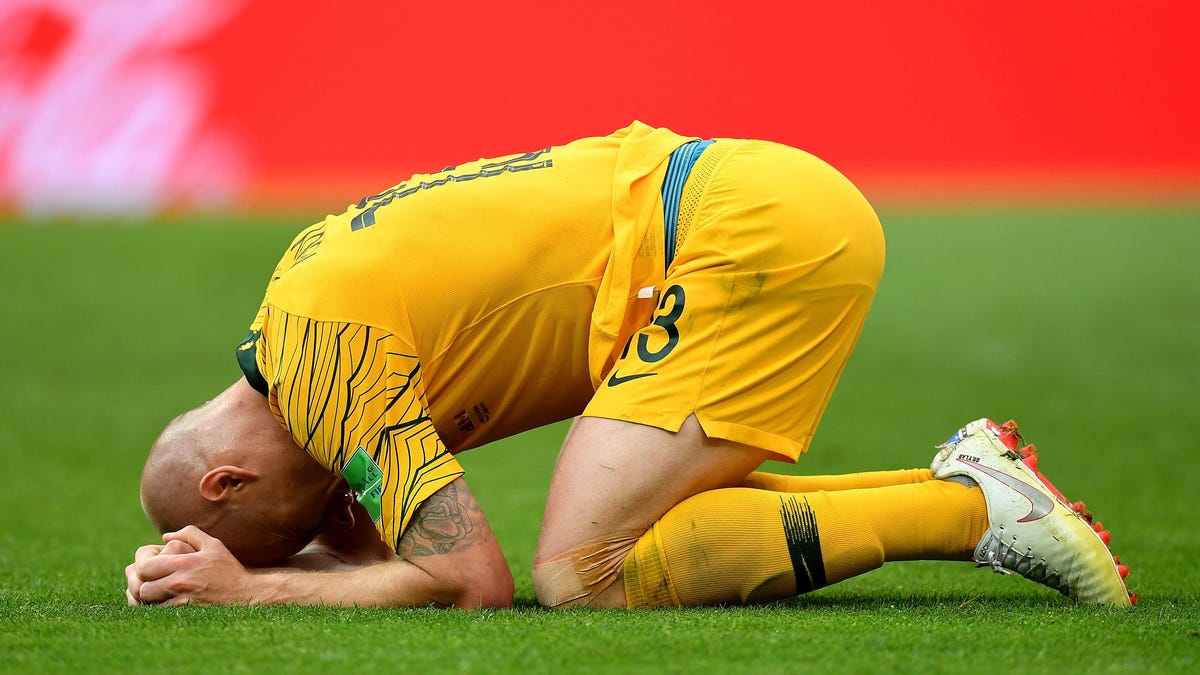How Australia almost buggered up World Cup streaming completely
Commentary: This year, the battle is on between streaming companies and broadcasters to win World Cup viewers. But Down Under, one streaming newcomer has screwed it up.

Australia's loss to Peru wasn't the only reason Aussies were unhappy this World Cup.
Australia is fierce about its football.
A strong history of European immigration, an almost religious devotion to sport and the kind of grim determination you would only find in a country roughly 5,000 miles from anywhere, all combine to make us madly devoted to the world game and insanely proud when the national team takes the world stage.
And this year, the Socceroos made it to the World Cup. You bloody ripper!
So that was why it was such a huge deal when we almost missed the whole thing.
Australia's second-largest telecommunications carrier Optus bought the rights to stream all 64 games of the World Cup, exclusively through its Optus Sport app. It bought the rights from legacy TV broadcaster SBS (a network so renowned for programming only football and foreign films that it was once known as Sex Before Soccer), reportedly spending AU$8 million (roughly US$5.8M) for the privilege.
SBS would still be able to broadcast Socceroos games and the finals, but to watch any other World Cup matches, Australians would need to pay AU$15 a month to watch them through the OptusSport app.
This was a huge deal in Australia. Sure, no one likes paying for something they previously got for free, but the SBS-Optus sell off went beyond that. SBS has a lot of cred in Australia's first- and second-generation immigrant communities, it has a legacy in bringing overseas sports (like the World Cup and the Tour de France) to viewers and it has a place in many hearts as a partially public-owned broadcaster.
Optus had big boots to fill.
But, to use an Aussie phrase, Optus munted it up. Its World Cup run has been a story of app error messages, streaming drop outs and, ultimately, ceding all games back to the original broadcaster it bought the rights off.
So I don't fully understand:
— Mark Pesce (@mpesce) June 20, 2018
Optus runs an actual nationwide phone network and they couldn't handle World Cup streaming?
How. Is. That. Possible?
Obviously a Royal Commission into the Optus World Cup debacle is the only sensible way forward. #WorldCup
— Titus O'Reily (@TitusOReily) June 18, 2018
Big ups to the Nonna's, Yiayia's and Teita's that cursed Optus and brought the World Cup home to SBS
— 𝔤𝔢𝔬𝔯𝔤𝔦𝔞 𝔱 🏳️🌈 (@geotk_) June 20, 2018
Optus: "Streamed World Cup for all"
— Ben Smith (@BenSmith94) June 20, 2018
"Boo"
"Very well, no streamed World Cup games at all"
"Boo"
"Hmm...streamed World Cup games for some, miniature Australian flags for others" pic.twitter.com/25MPAa8A8W
The problems set in from the opening weekend of the tournament, when football fans started complaining of error messages and dropouts while trying to stream the Egypt versus Uruguay match (a game only available through the app).
Australians feel these dropouts keenly. If we're watching an international sporting event, chances are we stayed up 'til A Million O'Clock curled up in our Ugg Boots and doona on the couch, thanks to our ridiculous time zone. We are serious about watching sport live -- to use another Aussie phrase, we didn't come here to f*** spiders.*
(*International readers note: A 100 percent real Australian phrase. Basically, "We're not here to mess around.")
After initially offering apologies on social media and promising to fix the experience, Optus held a late evening media call to advise it would be simulcasting 48 hours of games on SBS. The network that had sold off the rights was now getting its games back.
One week later, after mea culpas from Optus CEO Allen Lew and more promises to fix the network, Optus confirmed SBS would simulcast the games until the end of the knockout stages. They also dropped the paywall on the app, giving it to all Australians for free.
Finally, on Thursday, Optus capitulated completely. While the Optus app would still offer free streaming, SBS would get all games for the remainder of the Cup on broadcast TV.
The Optus story is a valuable lesson for any carrier trying to jump on the media train in the digital era. We've seen it elsewhere, with tech companies trying to land sports rights (see Twitter and the NFL), comms companies trying their hand at media (see AT&T's merger with Time Warner) and carriers trying to diversify their offering by selling content, not just the means of consuming it.
Recognising the threat of streaming, tech companies and carriers are eager to add another string to their bow and start offering content. But if your legacy is in poles and wires, and your streaming offering has hitherto offered niche sports or select games and even then only to a select group (in Optus' case, English Premier League games available only to Optus customers), you're a long way from building Netflix-level scale.
That's not to mention the fact that delays and dropouts can leave fans out of sync with the live broadcast. In a world where fans are tweeting every goal and creating memes in seconds to share with other fans, your stream has to be live. Not negotiable.
Streaming tech company Ooyala sent out a warning to TV networks at the start of the World Cup that this year's event "may well be the last hurrah for traditional broadcasters against mounting pressures from OTT [over the top] streaming services."
But if streaming companies aren't up to the challenge, they may have to stay on the bench a little longer.
World Cup 2018: Find out how to watch, learn some trivia and more.
CNET Magazine: Check out a sample of the stories in CNET's newsstand edition.

